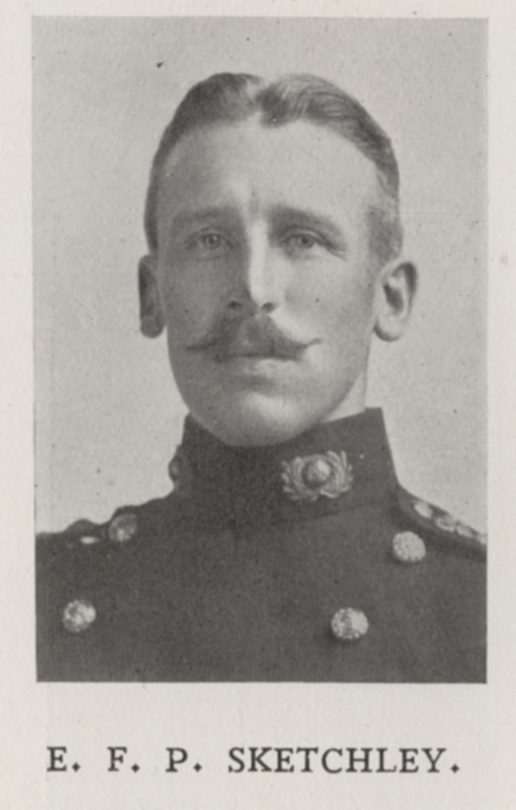Sketchley, EFP
(1881 - 1916)

Key Facts
DATE OF BIRTH:
6th August 1881
YEARS ATTENDED THE COLLEGE:
1895 - 1899
HOME ADDRESS WHEN AT THE COLLEGE:
Ballater, 30 Tweedy Road, Bromley
REGIMENT
Royal Marine Light Infantry
FINAL RANK:
Major
DATE OF DEATH:
12th October 1916
AGE AT DEATH:
35
WHERE HE DIED (or was wounded)
Near Albert
LOCATION OF GRAVE OR MEMORIAL:
Forceville Communal Cemetery and Extension. Plot 3. Row E. Grave 1.
Major Ernest Frederick Powys Sketchley
Born on August 6th 1881, Ernest was the eldest son of the Rev. Ernest Sketchley, a clergyman and secretary of the Society for the Propagation of the Gospel, and his wife, Ada. He was for a time educated at Bromley Park School before, in 1895, coming to Dulwich. He went on to spend two years in the 1st XV, in 1898 and 1899, and in the latter year was awarded the Challenge Cup as the outstanding forward of the season. He left Dulwich at the end of 1899 and, although he had qualified for a place at Sandhurst, instead opted to take a commission in the Royal Marines, subsequently spending time training at the Royal Naval College, Greenwich. In 1902 he was appointed to H.M.S. Aboukir and subsequently spent the next three years serving aboard the ship in the Mediterranean. In May 1905 he transferred to Western Australia, and for three years served as Aide-de-Camp and, eventually, Private Secretary to Admiral Sir Frederick Bedford, the Governor of Western Australia. In 1908 he returned to England, where he served as Adjutant to the Plymouth Division, and in 1911 was promoted to the rank of Captain.
Shortly after the declaration of war in the summer of 1914 Ernest was involved in the raids on Antwerp and Ostend and that September was promoted to Major. Shortly afterwards he began serving as General Staff Officer on the Staff of the Royal Naval Division. In April 1915 he went out to Gallipoli where he was involved throughout the invasion and all the way through to the evacuation at the end of that year. Whilst there he was awarded the D.S.O. for his actions on July 13th near Achi Baba in preventing the threat of a retreat. After the withdrawal from Gallipoli he remained on the staff of the 63rd Royal Naval Division with whom he was posted to France in May 1916. On October 12th he was inspecting trenches near Albert alongside General Archibald Paris when he was caught in a shell blast, dying instantly. He was survived by his widow, Phyllis, whom he had met whilst posted in Australia, and their son, Murray, who would himself later go on to attend Dulwich.